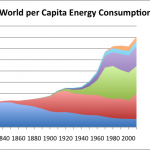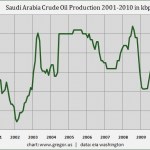peak energy
The always-thoughtful Gail Tverberg has a great post that simply shows in visual terms the history of world energy consumption - well worth a look. I've reproduced one of her graphs here, but please read the whole thing.
One graph not in her post (not suggesting it should be, but I like the contrast) is world discovery of oil over about the same period - anyone who implicitly believes we are discovering vast reserves should contrast the two:
(Source, Colin Campbell)
Gail goes on to write about how an economist might be misled by past trends to disregard "facts in the ground" - lack of…
There's a very good piece in the Guardian about the ways that Eastern Japan's energy crisis is a model for experiences we might have in the future:
For large parts of eastern Japan that were not directly hit by the tsunami on 11 March 2011, including the nation's capital, the current state of affairs feels very much like a dry-run for peak oil. This is not to belittle the tragic loss of life and the dire situation facing many survivors left without homes and livelihoods. Rather, the aim here is to reflect upon the post-disaster events and compare them with those normally associated with the…
One of the things I've been arguing for years is that most people in the developed world, given a perceived lack of alternatives and no narrative to explain change and sacrifice, will do almost anything to keep their present way of life. I point out that if they become cold enough most people would shovel live baby harp seals into their furnace to keep warm, while carefully justifying why this is reasonable and necessary and probably convincing themselves that baby harp seals like to be burned alive.
I have been thinking much about this metaphor lately, as the tone of the discussion of…
(Yes, I will eventually explain this ;-))
I don't usually participate in the Huffington Post bashing that goes on at science blogs. Not because I don't often agree with it, but because my colleagues seem to have it covered when it comes to autism/vaccine links and dubious medical studies. Still, Raymond Learsy's column about Wikileaks did catch my attention, and it seems to have all the best qualities of a bad HuffPo piece.
If it's in Wikileaks, it's got to be true. Certainly it was a moment of triumphal satisfaction for the Peak Oil Pranksters. There it was in "cloud" black and white…
If you haven't seen this video by Richard Heinberg and the Post Carbon Institute, you should. In a lot of ways it is an excellent summary of the history of fossil fuels, entertainingly and creatively done. In some ways, it is extremely valuable as a basic educational piece.
I'm very impressed with the clarity of this video, but it does have an odd gap in it - all of the human history of 300 years of fossil fuels doesn't have a single female person in it - not one. Women are addressed by implication when population is mentioned - but all the little hand-drawn people are men. There is a…
It is claiming I don't have permission to embed it (I do, actually), so you can see the video here.
I gave this talk back at the beginning of October, in my conference as a member of the ASPO-USA Board. This was only the second time that ASPO has had a significant talk about the connection between food and agriculture, so instead of trying to make claims about how this may play out, I focused on what we already know to be true. As you all probably know, I think that we've barely begun to plumb the depths of the connections between food and energy. I will say, if I ever give a talk there…
Well, we've finally got a mostly-complete ASPO Conference schedule. The problem is exactly the sort of problem you'd really like to have when running one of these - that there are just too many serious thinkers who need a spot. It is really tough to finalize the conference schedule when every day you are receiving calls that say things like "This is Bianca Jagger, Chair of the Human Rights Foundation, calling to say that I'd like to speak at your conference on the connection between Climate, Energy Depletion and Human Rights...here are the texts of my UN speeches if you'd like to see them…
The realities of climate change and energy depletion mean that at some point, we will encounter situations where there is not enough of an energy resource or one of the things it enables - whether food or transport or whatever, to go around. In fact, eventually we will enounter many of these shortages. Whether they arise initially from a situation in which there are actual shortages or whether the shortages are structural problems of transport or caused by inequity and dishonesty almost doesn't matter - we are going to run bang up against problems of access to resources.
When that happens,…
Ugo Bardi has a lovely article about both peak oil and intergenerationalism:
I sort out again my old watch, "You see, this old watch is still working, more than 70 years after it was made. Whenever I look at it, I feel a kind of kinship to the man who had left it to me. I am grateful to him because he left me something that still works, that I can use and that I like. And I think he may be happy, too, if he looks at us from above, that his old watch is still appreciated by someone in this world". I pause for a moment to look upwards, as if I were seeing the ghost of the old Swiss man. The…
In 2006 when I first met Julian Darley, author of _High Noon for Natural Gas_ and the founder of the Post-Carbon Institute, the world was excited by then-famous "Jack" oil field find in the Gulf of Mexico. Both of us were watching the way the world was interpreting the data - people were claiming that there might be 10, 12, 15 billion barrels of oil - five miles down underneath the ocean. The media was excited, ignoring the fact that large oil field potential reserves are routinely revised - and almost always downwards. The public and the media, without enough knowledge of oil production…
I came back to my computer to find that many of my fellow Sciblings have recently taken up issues of resource depletion from various interesting perspectives - doing my work for me, I guess ;-). It isn't exactly news to most of us that we've been using just about every resource on the planet far too casually, but it is interesting to see them tied together.
At Starts With a Bang, Ethan Siegel takes up issues raised by Helium's scarcity and the fact that our use of it to make children's toys may seriously imperil future research capacities.
At Dr. Isis's blog, she builds on this by exploring…
In an American Chemical Society paper, "Forecasting World Crude Oil Production Using Multicyclic Hubbert Model" authors Ibrahim Sami Nashawi, Adel Malallah and Mohammed Al-Bisharah propose:
Even though forecasting should be handled with extreme caution, it is always desirable to look ahead as far as possible to make an intellectual judgment on the future supplies of crude oil. Over the years, accurate prediction of oil production was confronted by fluctuating ecological, economical, and political factors, which imposed many restrictions on its exploration, transportation, and supply and…
I'm back after four days of teaching a workshop at my house. It was awesome. It was exhausting. It was fascinating. We milked goats (note, very small adorable goats sell themselves. It is not necessary to talk them up, just to frisk people trying to hide goats under their jackets on the way out ;-)). We talked lactofermentation. We laughed a lot. We cooked on the woodstove. We knit stuff (ok, they knit stuff, I didn't knit much, since I was trying to manage everything). We talked about the future and where we think it is going. We laughed a lot. We talked about growing things and…
Note: This is the beginning of a multi-part series on agricultural education, the farming demographic crisis and the question of who will grow our food - what the problems are, how we will find new farmers, how they will be trained. To me, this is one of the most urgent questions of our time.
A quick, Jay Leno style quiz for the man and woman on the street.
Who will grow your food in the coming decades?
A. My friendly neighborhood agribusinessman will grow my food on a plantation the size of Wyoming using nearly enslaved non-white folks who are deported minutes after harvest. Or maybe…
The art of losing isn't hard to master;
so many things seem filled with the intent
to be lost that their loss is no disaster.
Lose something every day. Accept the fluster
of lost door keys, the hour badly spent.
The art of losing isn't hard to master.
Then practice losing farther, losing faster:
places, and names, and where it was you meant
to travel. None of these will bring disaster.
I lost my mother's watch. And look! my last, or
next-to-last, of three loved houses went.
The art of losing isn't hard to master.
I lost two cities, lovely ones. And, vaster,
some realms I owned, two rivers, a…
Energy Bulletin ran this excellent piece from the New York Times on a crisis facing Mongolian Goat Herders who are attempting to deal with unstable world markets, climate change and overgrazing. I was fascinated by the clear way that the author of the piece lays out the vicious circle that they've entered into, and I was struck by how useful an example it is of the kind of ecological vicious circle that we face all the time:
To compensate for low prices, herders have been increasing supply by breeding more goats -- a classic vicious circle. Mongolia's goat population is now approaching 20…
I was just laboring over a post designed to explain the relationship between energy returned over energy invested and the importance of the *rate* of that return for our expectations about future resources, when I found out that Dr. Tom Konrad had already done this - yay! I think this is a useful and clear way of articulating the problems of future renewables. While I don't agree with all Konrad's conclusions as they are expressed (more on that in a second), I think he makes the relationship between EROEI and Rate of Return very clear and does so in a remarkably useful way. He writes:
The…
The IEA has pretty much conceeded peak oil, announcing that growth to meet demand in the coming decades will come from entirely mythical sources. Ok, they didn't say that, what they said in the latest World Energy Outlook was that the majority of oil production by 2030 will be coming from "fields yet to be developed or found." But what that means is "we're hoping someone with magic powers will come and reverse the long-stand trend towards decline in oil discovery." Because we know that oil discovery peaked in 1964 and has been declining ever since, so that we are consuming oil five times…


